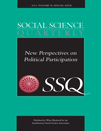Objective.
One explanation for why voters’ preferences are privileged by policymakers is that voters are likely to communicate their preferences through additional avenues as well. We examine this “communication hypothesis” by comparing the policy preferences of different types of political participators.
Methods.
We analyze the National Annenberg Election Survey (2008) using latent class analysis to identify different types of political participators and multinomial logistic regression to compare the policy preferences of these participator types.
Results.
Voters who also engage in additional online and/or offline political acts have policy preferences that differ in a number of meaningful ways from those who “only” vote.
Conclusion.
The findings indicate that prior research has overlooked important evidence on the connection between citizen participation and political outcomes due to a primary focus on the act of voting. This study suggests how future research can assess the impact of citizens’ broader patterns of political participation.
Authors
- Jennifer Oser, University of Pennsylvania
- Jan E. Leighley, American University
- Kenneth M. Winneg, University of Pennsylvania


